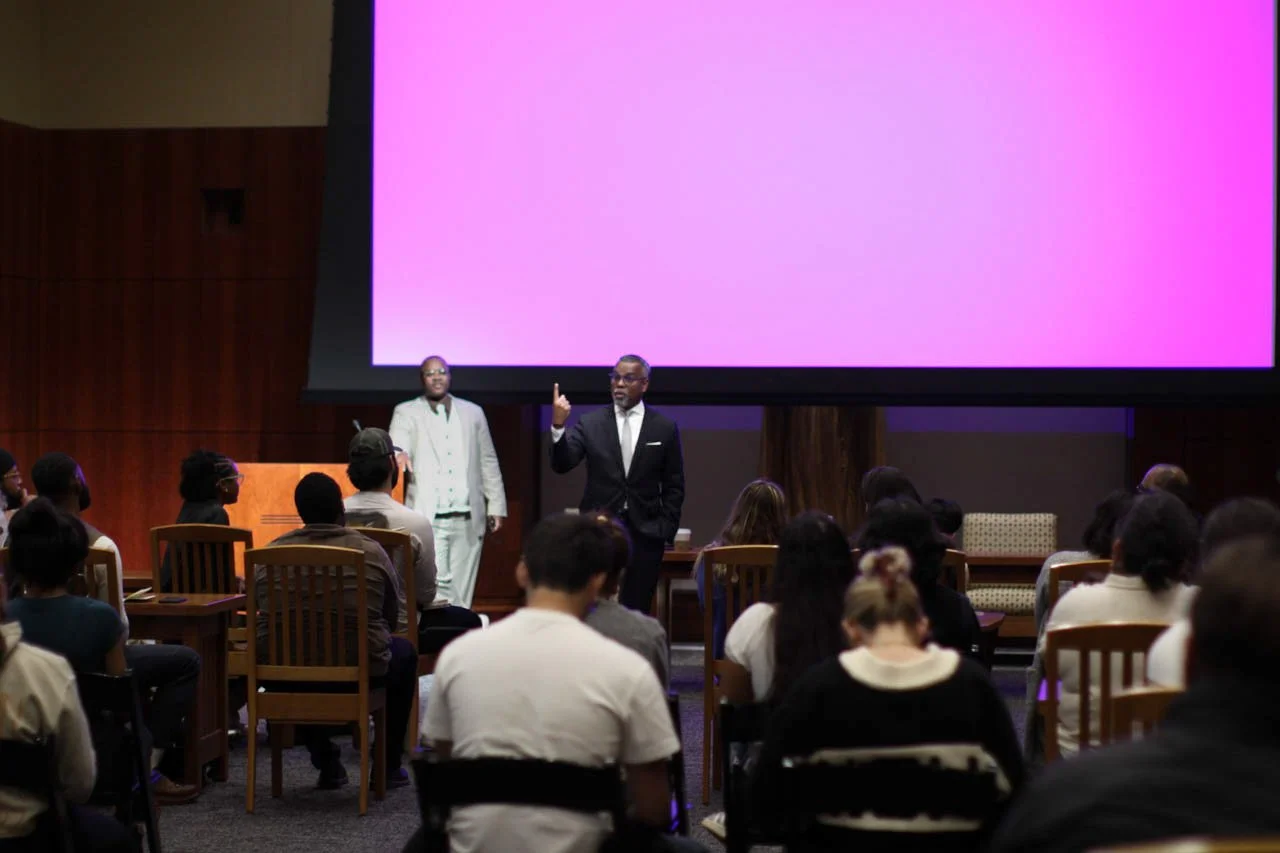Black Justice: Two Americas
Photo by Isa Montes.
Glaude passionately delivers his address to a pack audience.
The St. Clare room erupted again into applause as Dr. Eddie S. Glaude Jr. finished his speech and returned to his chair, the power of what had just happened embedding itself within the audience. “I could not tell if he was storytelling, thinking, or preaching!” said associate professor of the history department, Harry Nii Koney Odamtten. “All of the above!” shouted a member of the audience.
The College of Arts and Sciences kicked off their first event in a series for the new Black Justice Studies Collaborative with a presentation by Dr. Eddie S. Glaude, Jr. on Thursday, Jan. 16. Glaude is a political commentator for MSNBC and appears on shows like The Morning Joe and Meet the Press, as well as being a New York Times bestselling author and professor of African American Studies at Princeton University. In her introduction, Professor Marget Russell said that Glaude focuses on the “complex dynamics of the human experience.”
What dynamic could be more complex than President Donald J. Trump’s inauguration on Monday, Jan. 20., a day which is also celebrated as Martin Luther King Jr. Day. Glaude began his speech by asking the audience to think about the irony of the celebration this year, and to that a “wave of white resentment and grievance is coming to the white house” after a “profound betrayal and backlash.” Here, Glaude is referring to the political tensions between the right and left after the most recent election and the emotions that come with specifically a new Trump presidency.
Glaude continued his speech by recalling King and the backlash and betrayal that he also faced during his time. The motif of history repeating itself arose throughout the presentation as Glaude noted several times that “two Americas collide on Monday.” The speech contained quotes from King, W.E.B Dubios and Fredrick Douglass, as Glaude connected betrayals throughout history and the patterns they often repeat. He called on the audience to look at how those great men of history discussed their pain, and how they came to terms with it. Glaude’s prolific use of quotes and historical anecdotes rooted his presentation in history while showing to the audience how applicable those lessons and words still are.
The speech was electric. Glaude’s hands moved wildly around the air, conveying his impassioned tone and introducing humor in a way that grabbed the audience’s attention so viciously that it seemed like the walls themselves were paying attention. Throughout the presentation, members of the audience nodded in agreement and shouted out words of affirmation during the more passionate pauses. The audience was in communion with Glaude as if it were a church sermon.
After reflecting on how the works of Douglass parallel the struggles of King’s life, Glaude shifted back to the present and the importance of MLK Day as a national holiday. In closing, Glaude highlighted how those same struggles are emphasised by Trump’s inauguration as he asked the audience, “which America will you choose?”
The power and electricity in the room piqued as a standing ovation finished out Glaude’s speech. The event concluded with audience questions from students, alumni and visitors alike. Glaude interacted with each question as if they were having a one on one conversation, leaving the whole room feeling like they were all a part of an intimate but important conversation.
As the audience left the St. Clare, echoes of his question, “Which America will you choose?” lingered in the air. For many, the event served not only as a reminder of the struggles of the past but also a call to action for the present. Natalie Hanna ’26 said, “I was struck by Glaude’s ability to inspire and connect with the audience in such an impactful way. I am leaving knowing that I learned something new and with a new perspective.” The history department’s Black Justice Studies Collaborative had set the tone for what promises to be a transformative series, leaving an indelible mark on those who attended.
